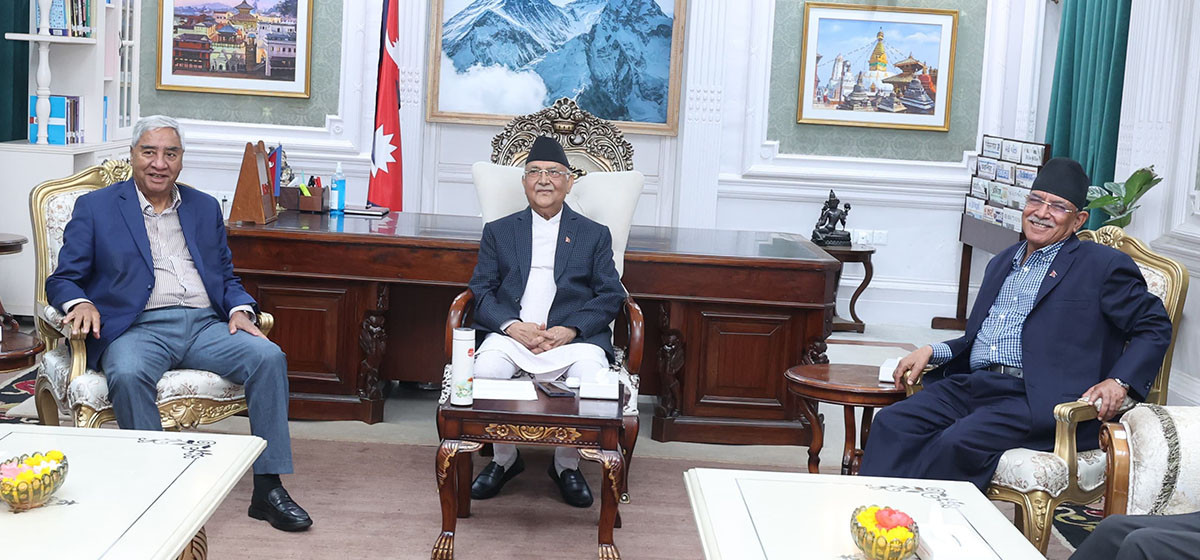Parliament meetings have been obstructed for the past few days. In Thursday's meeting, lawmakers belonging to the ruling and opposition parties were engaged in a brawl in the parliament. When the lawmakers belonging to the opposition parties surrounded the home minister to prevent him from speaking in the House, the MPs, including the Chairman of CPN-UML, started to literally retaliate, turning the House of Representatives into a kind of "battlefield." The opposition has clearly stated its position regarding the formation of a parliamentary committee to investigate cooperative fraud that brings Chairman of Rastriya Swatantra Party (RSP) Rabi Lamichhane, who is also a Deputy Prime Minister and Home Minister in the Dahal-led cabinet, under its preview. All opposition parties, including the NC, the largest party in HoR, have agreed on the demand for a Parliamentary Probe Committee. The ruling party, however, has not made its stance clear yet. Prime Minister Pushpa Kamal Dahal has not made a definitive statement in public, while UML Chairman KP Oli has appeared against any such probe panel. It was publicized that RSP Chairman Lamichhane, who was allegedly involved in the cooperative fraud case, had agreed to form an inquiry committee before he could speak in Parliament. After not being able to speak in Parliament on Thursday, RSP leaders have begun to say that the committee cannot be formed. This is likely to prolong the parliamentary deadlock, although, of course, Prime Minister Dahal has expressed confidence in public that they could reach an agreement to end the deadlock by Sunday.
Political parties should find ways to resolve issues of judicia...

Prime Minister Dahal is in continuous talks with NC leaders. On Saturday itself, he held a series of talks with NC leaders and leaders from the ruling alliance. NC leaders have indicated that Prime Minister Dahal is "positive" about forming a parliamentary inquiry committee. It seems that NC leaders are acting as spokespersons for Prime Minister Dahal as the latter has not made any comments on the demands of the opposition parties. If Prime Minister Dahal is genuinely ready to form a parliamentary inquiry committee on cooperative fraud, then he should speak this in public. The NC wants Home Minister Lamichhane's name or the names of related cooperatives to be included in the mandate of the inquiry committee. The RSP leader believes the names should not be mentioned. UML probably wants no inquiry into cooperative fraud at all. But Prime Minister Dahal's opinion on this issue remains unclear. It seems he might align with the NC in favor of the inquiry committee, while being pressured to become a 'helpless shadow' of the UML Chairman in the ruling coalition. As a newspaper, we see that this has only aggravated the problem.
The primary responsibility for creating a conducive environment for the functioning of parliament lies with the Prime Minister. Therefore, he should realize that increasing tension by playing between political parties can be counterproductive. If this confusion continues, there may be a demand for forming a 'Judicial Inquiry Commission' empowered to investigate the cooperative fraud. This also feeds into the public perception that the Parliamentary Inquiry Committee is ineffective. Therefore, Prime Minister Dahal should clearly state his position as soon as possible. He needs to clarify whether he supports a fair investigation of the cooperative fraud or if he favors protecting Home Minister Lamichhane from the investigation, to make both opposition parties and the public understand his intention. Becoming a mere shadow of coalition partners will be counterproductive not just for himself but also for the functioning of parliament. There are also rumors that some of the ruling parties want to prorogue the ongoing parliamentary session under the pretext of obstruction from the opposition parties and introduce several ordinances, including one related to Political Parties, in an apparent bid to orchestrate the split of parties in Parliament and bolster the position of the ruling coalition in the parliament. This is the last thing the prime minister should do if he wants to save his political integrity and demonstrate his accountability toward the people he is meant to serve. All parties must work together to resolve the parliamentary deadlock.






































